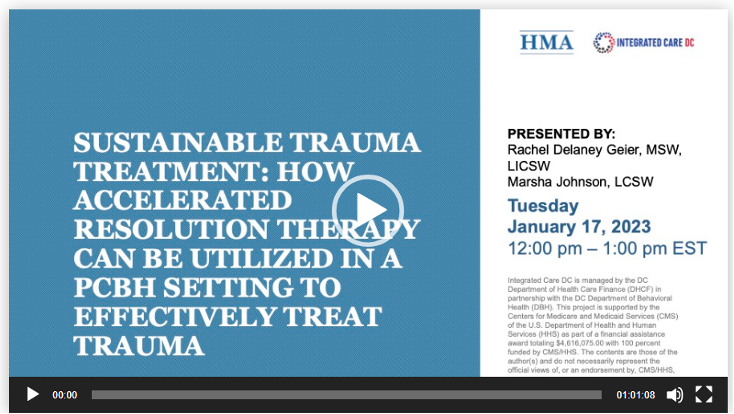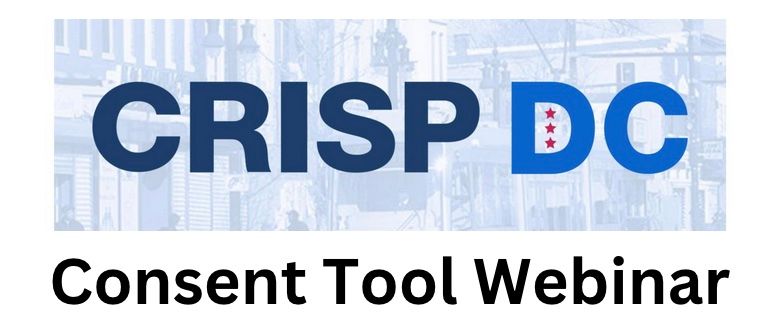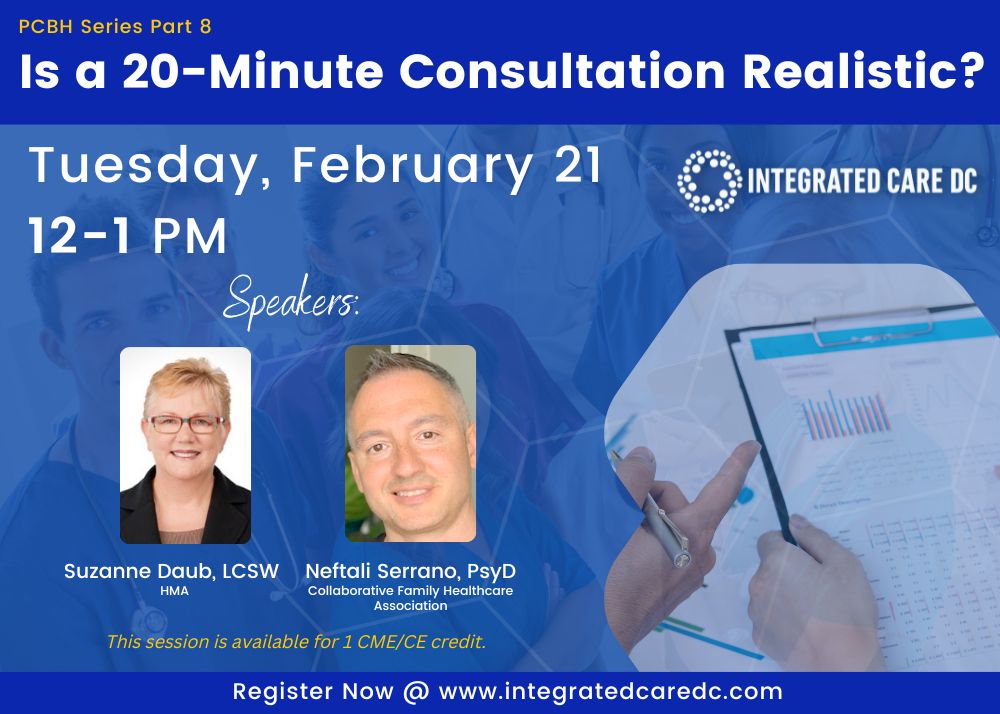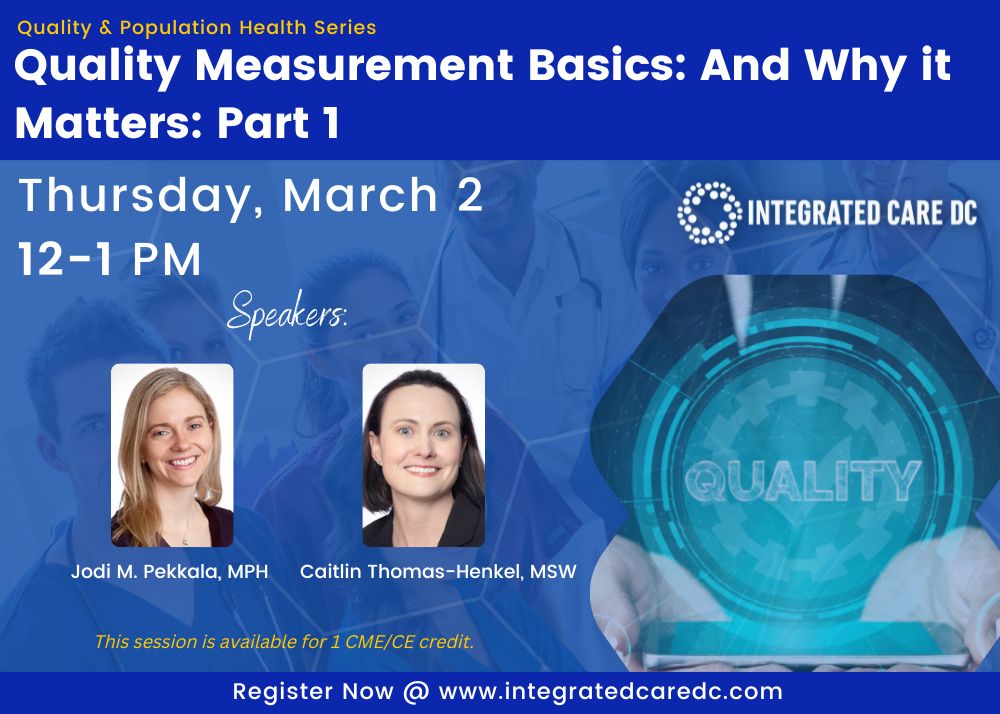In this issue:
- Upcoming Lunch and Learn Sessions
- Practice Spotlight: Community Wellness Ventures Integrates Data to Support Care
- Resources for Black Mental Health and Wellness
- Latest from Learning Library
- In Case You Missed It…CRISP DC Consent Tool
- Dive into a Topic
New & Resuming Learning Series Start Today!
Do you find integrated care easier to describe than to practice? Starting today, three learning series – Primary Care Behavioral Health (PCBH), Quality & Population Health, and Motivational Interviewing – will give you practical skills to tackle common practice challenges. You can earn one CME/CE credit for each one-hour live session. As a reminder: prior attendance is not required for any webinar series. If you missed a live webinar, you can still catch up by watching recordings on-demand in the Learning Library.
(1) PCBH Learning Series
Watch on-demand all previous PCBH Learning Series.
Part 8: Happening Today: Tuesday, February 21 | 12:00 – 1:00 pm
Is a 20-Minute Consultation Realistic?
Speakers: Suzanne Daub, LCSW and Neftali Serrano, PsyD, Collaborative Family Healthcare Association
Part 9: Tuesday, March 21 | 12:00 – 1:00 pm
Addressing Grief in PCBH
Speaker: Marsha Johnson, LCSW
Part 10: Tuesday, April 18 | 12:00 – 1:00 pm
Dosing and Titrating Care
Speakers: Suzanne Daub, LCSW and Neftali Serrano, PsyD, Collaborative Family Healthcare Association
Part 11: Tuesday, May 16 | 12:00 – 1:00 pm
New Diagnosis of a Chronic Condition
Speakers: Suzanne Daub, LCSW
Part 12: Tuesday, June 20 | 12:00 – 1:00 pm
Engaging Families
Speakers: Suzanne Daub, LCSW and Jennifer Hodgson
(2) Quality & Population Health Learning Series
Part 1: Happening Soon: Thursday, March 2 | 12:00 – 1:00 pm
Quality Measurement Basics: And Why it Matters (Quality & Population Health Series, Part 1)
Speakers: Jodi M. Pekkala, MPH and Caitlin Thomas-Henkel, MSW
Part 2: Register Now: Wednesday, March 8 | 12:00 – 1:00 pm
Guiding: Using Motivational Interviewing Skills to Guide Conversations (Motivational Interviewing Series, Part 2)
Speakers: Suzanne Daub, LCSW and Marsha Johnson, LCSW
(3) Motivational Interviewing Learning Series
Part 1: Watch on-demand: Motivational Interviewing Refresher: Using Open Ended Questions, Affirmations, Reflection & Summarizing (OARS) Skills to Strengthen Motivation to Change
Part 2: Register Now: Tuesday, March 14 | 12:00 – 1:30 pm
Treatment Planning (Quality & Population Health Series, Part 2)
Speaker: Debbi Witham, LMSW
Integrated Care DC Practice Spotlight
Community Wellness Ventures Integrates Data to Support Car
Community Wellness Ventures (CWV) believes mental health and wellness services are essential to the overall success of the larger society. It is why they have partnered with the District to address the needs of the “whole person,” including system approaches to mental health, aligning housing and employment resources, and addressing specific comprehensive needs of residents.
We are featuring one or more participating practices in the Integrated Care DC program that are making exceptional progress delivering whole-person care for DC residents. If you know a practice or someone deserving of this feature or want to feature yourself, use this link to tell us more.
Black Mental Health and Wellness

According to the 2019 DC Community Health Needs Assessment, non-Hispanic Blacks residents have the lowest life expectancy at 73.6 years compared to 91.8 years for Hispanics. The report states access to affordable, quality, and timely health care can help prevent diseases, detect issues sooner, and manage health conditions, enabling individuals to live longer and healthier. Black History Month reminds us of the need to continue addressing persistent racial, ethnic, and socioeconomic disparities in physical and behavioral health. Integrating physical and behavioral healthcare holds promise for reducing such disparities. To advance health equity in the District, we must address systemic, structural, and sociocultural barriers to high-quality care for underserved populations.
We have included several resources and upcoming events that offer opportunities for our health system to help meet the District’s unique
health needs and challenges:
CMS’ inaugural Health Equity Conference, Framing the Future of Equitable Health Care, will be held June 7-8, 2023 at Howard University’s Armour J. Blackburn University Center in Washington, D.C. and streamed virtually for online participation.
The Mayor’s Office on African Affairs for Mental Health and Wellness Workshop for Black Men, a discussion on shifting culture around mental health and wellness amongst Black men and share culturally sensitive methods of care on February 23 at 6:00 pm at the Martin Luther King Jr. Memorial Library.
Chronic Care Management and Connected Care: Through the Connected Care campaign, the CMS Office of Minority Health and the Federal Office of Rural Health Policy at the Health Resources and Services Administration raises awareness of the benefits of CCM for patients with multiple chronic conditions and provide health care professionals with resources to implement CCM. To learn more, visit go.cms.gov/ccm.
The Mental Health Technology Transfer Center Network, funded by the Substance Abuse and Mental Health Services Administration, offers curated resources for the mental health workforce on cultural responsiveness, racial equity, and cultural diversity.
DC’s Department of Behavioral Health helps connect individuals and families with local mental health and substance use disorder providers.
Latest from the Learning Library

- Sustainable Trauma Treatment: How Accelerated Resolution Therapy can be Utilized in a PCBH Setting to Effectively Treat Trauma (PCBH Series Part 7)
- Motivational Interviewing Refresher: Using Open Ended Questions, Affirmations, Reflection and Summarizing (OARS) skills to Strengthen Motivation to Change (Motivational Interviewing Series, Part 1)
- Allowing Data to Tell a Story: Relevant Metrics to Help Reflect the Infinite Values of Integrated Healthcare
- Achieving Better Outcomes Through Value-Based Care and Population Health Strategies
In Case You Missed It…

CRISP DC has launched a new consent tool, which enables Substance Use Disorder (SUD) providers who have executed a qualified service agreement (QSOA) to share data protected by 42 CFR Part 2 through the HIE upon patient consent. This tool aims to improve care coordination between SUD providers and other health care providers, strengthen continuity of care for patients throughout SUD treatment levels, and ease workflow burden when obtaining consent and disclosing information. You can find videos and other helpful resources on CRISP DC’s Consent Tool page at https://crispdc.org/consent. Additional CRISP DC webinars on the Consent Tool are planned for the future.
- Part 1: Consent to Share Substance Use Disorder Information: The Basics
- Part 2: Consent to Share Substance Use Disorder Information: A Provider’s Experience
- Part 3: Consent to Share Substance Use Disorder Information: Office Hours
Dive into a Topic
Behavioral Health | Econsult/Telehealth | Screening and/or Assessment | HIE
Care Team Optimization | MAT | COVID-19 | Patient Engagement
Stigma Abatement | Substance/OUD
We publish on the 1st and 3rd Tuesdays of the month. If you have content for our monthly newsletter, mid-month update, or have feedback or comments, we want to hear from you. Send us an email at: communications@integratedcaredc.com



